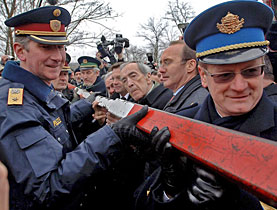EU expands border-free zone, Swiss join later

Border controls from the Baltic Sea to the Adriatic ceased to exist from midnight Thursday in Europe's passport-free travel zone.
Switzerland is due to join the Schengen Area in November 2008, but the move is likely to be delayed as ratification of the treaty with several European Union member nations is still pending.
The entry of nine former mostly eastern European states is seen by many as a final lifting of the old Iron Curtain divide between the former Soviet bloc and the West.
But the lifting of border checks has triggered fears of a rise in crime and a flood of illegal immigrants.
From one minute past midnight the Schengen Area was extended to cover Poland, Slovakia, Hungary, the Czech Republic, Slovenia, Latvia, Lithuania, Estonia and Malta.
With its current 24 members it creates an area one-third the size of the United States affecting 400 million people and allowing passport-free travel over 4,000 kilometres.
“Together we have overcome border controls as man-made obstacles to peace, freedom and unity in Europe,” said European Commission President José Manuel Barroso at a ceremony in the Estonian capital, Tallinn.
He said the expansion would boost trade and tourism, inject new life into border-region economies and put an end to the hassle of delays at most European borders.
Delays
Initially the lifting of internal controls involves just land and sea borders, but that will be extended to airports at the end of March 2008.
Switzerland, which is not a member of the EU, was initially scheduled to join the Schengen zone this year.
But delays in the parliamentary ratification process in three EU countries have made it unlikely that the area will be extended to Switzerland before 2009.
Swiss voters approved the Schengen treaty in a nationwide vote two years ago.
Switzerland will have to implement technical and legal changes and airport infrastructure – the only remaining border post to non-Schengen countries – will have to be adapted. The cantonal authorities – in charge of security at airports – also have to train up their police units.
Switzerland will have to pay into a special Schengen fund set up by Brussels. In 2006 the government estimated the Swiss contribution at about SFr13 million ($11.3 million).
On Thursday, EU countries approved a mandate to negotiate payments by non-EU members Norway, Iceland, Switzerland and Liechtenstein.
swissinfo with agencies
The Schengen Area comprises 24 countries, most of which are members of the EU, as well as the four member countries of the European Free Trade Asssociation – Iceland, Norway, Switzerland and Liechtenstein.
Britain and Ireland are not in the zone, but they have signed up to agreements on security.
A key element of the Schengen agreement is the Schengen Information Service (SIS), which includes a huge database in the French city of Strasbourg.
The SIS database enables police in any Schengen state to find out whether a suspect has been involved in any kind of crime across the EU.
The Schengen treaty takes its name from a town in Luxembourg where it was signed by Germany, France and the Benelux states in 1985.
Swiss parliament agreed the Schengen treaty in 2004.
Voters approved it with a 54.6% majority in a nationwide ballot in 2005.
Switzerland is expected to join the Schengen Area in 2008 at the earliest.
Special documents will be issued to fans, players and other staff of teams during the Euro 2008 football championships in Switzerland and neighbouring Austria next June.


In compliance with the JTI standards
More: SWI swissinfo.ch certified by the Journalism Trust Initiative











You can find an overview of ongoing debates with our journalists here . Please join us!
If you want to start a conversation about a topic raised in this article or want to report factual errors, email us at english@swissinfo.ch.